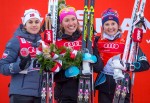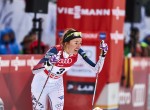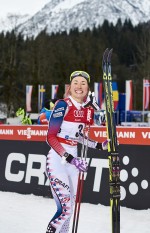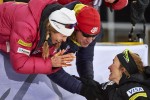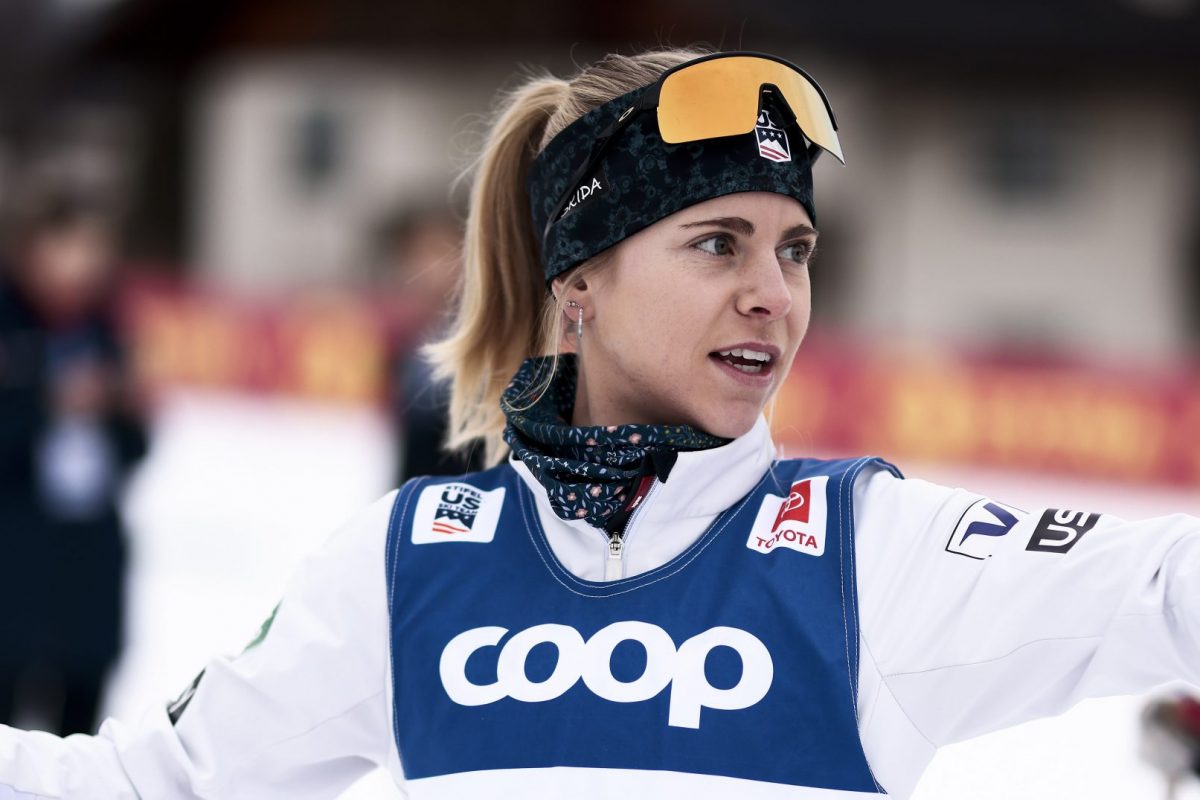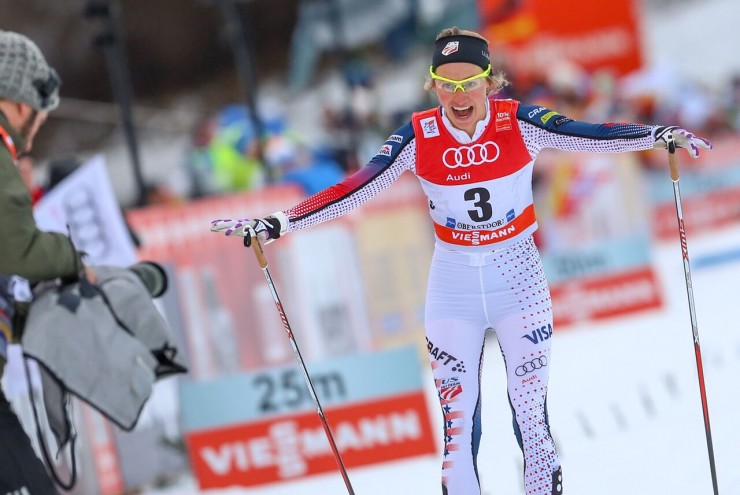
OBERSTDORF, Germany — Tuesday was definitely a thrilling day to be a U.S. nordic fan. The race format for the fourth stage of the Tour de Ski: a 1.2-kilometer classic sprint, was characterized by a single lap of wet, mushy, dirty snow.
Sophie Caldwell, of U.S. Ski Team and Stratton Mountain School T2 Team, shined through the gloomy, spitting weather; advancing through the heats and then beating out a final full of Norwegians and Swedes to take the top spot on the podium. In doing so, the 25-year-old Vermont native became the third U.S. woman to win a World Cup race, and the first to do so in a classic sprint.
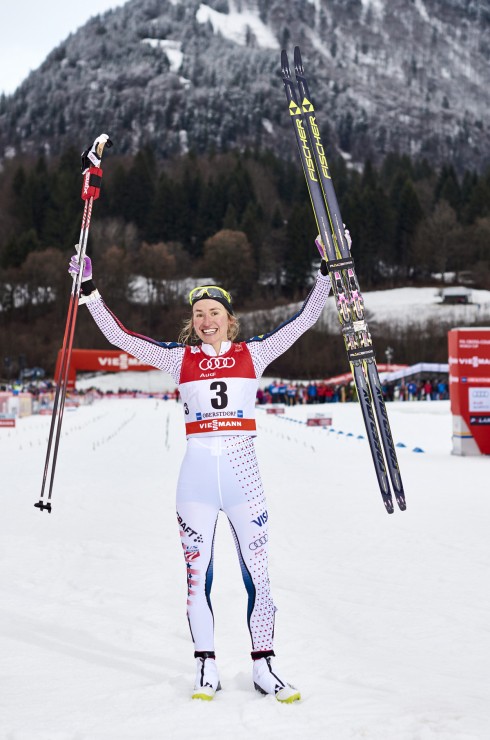
“Push it over the tops, stick on Ingvild on the ups, and have a strong finish.”
This was Caldwell’s magic mixture to reach the highest step in the podium, the spot every racer aspires to in their career. It was a simple-enough strategy, but it worked wonders in all of her heats, even securing her joyous victory in the final.
In the last month or so since the 2015/2016 World Cup season began, Caldwell has emerged as one of the world’s top sprinters. Her win didn’t come out of nowhere; some analysts observed she has been lurking in the shadows of the podium-frequenting Norwegians. She built up to Tuesday with multiple appearances in sprint finals: doing so in two of the three freestyle sprints preceding the Tour’s classic sprint in Oberstdorf.
The one time she missed the skate-sprint final, she did so by one place — finishing seventh in Toblach, Italy. In the only two sprints of the Tour, Caldwell qualified in second (on Jan. 1 in Lenzerheide, Switzerland; a skate sprint) and third on Tuesday.
In Lenzerheide, she narrowly missed the podium in fourth in the final. Before the holiday break, she placed seventh in Toblach and sixth in the skate sprint in Davos, Switzerland.
Yet on Tuesday, she beat the Norwegians at their game — classic sprinting — holding off Heidi Weng by 0.1 seconds in the finishing stretch with the win in 2:46.38 minutes. Ingvild Flugstad Østberg, the overall leader after both Stage 3 and 4 of the Tour, was the second Norwegian on the podium in third (+0.8), but after winning the qualifier to start the day, Østberg had been the favorite.
“It has been a while since I have been on the podium and that is the first sprint I have ever won,” Caldwell reflected in an in-person interview with FasterSkier after the race. “I am psyched. I never thought it would come in a classic sprint, so that was a pleasant surprise.”
The course, conditions, and resulting tactics
The Oberstdorf race stadium was far from a dreamy winter wonderland with sleigh rides and snow falling. There had been much uncertainty about whether the event organizers would be able to produce enough snow to cover the stadium race loop. About a week ago, the International Ski Federation (FIS) and the organizing committee gave Oberstdorf “the green light” for the fourth and fifth stages of the Tour. Then, as a rainy sleet mix fell heavily for all of Monday, it was hard to believe world-class ski races would happen there.
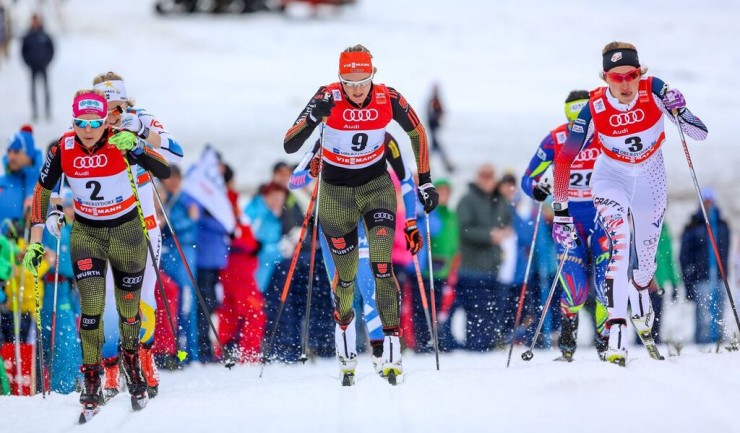
The course turned out to be quite soft, uneven and thoroughly saturated; a layer of mush on the top seemed to make control tricky. But across the board, athletes were impressed and expressed gratitude about the course the organizers and volunteers worked hard to prepare against the forces of warm weather. Caldwell, a New Englander, thrived in the less-than-ideal snow conditions.
After the race, U.S. Ski Team Women’s Coach Matt Whitcomb (who previously coached at Burke Mountain Academy in Vermont) commented how “these conditions today are like growing up in New England; skiing through slop, it’s no big deal.”
Temperatures in the mid-to-upper 30s and drizzle occasionally spitting down on racers made for a brutal day for the waxing team.
“Really difficult, really difficult,” Whitcomb emphasized, referring to the waxing. “This was a day that could not have been done without great skis.”
Caldwell described her skis as “amazing. … I was kicking up everything and they were clearly some of the best ones on the downhills.”
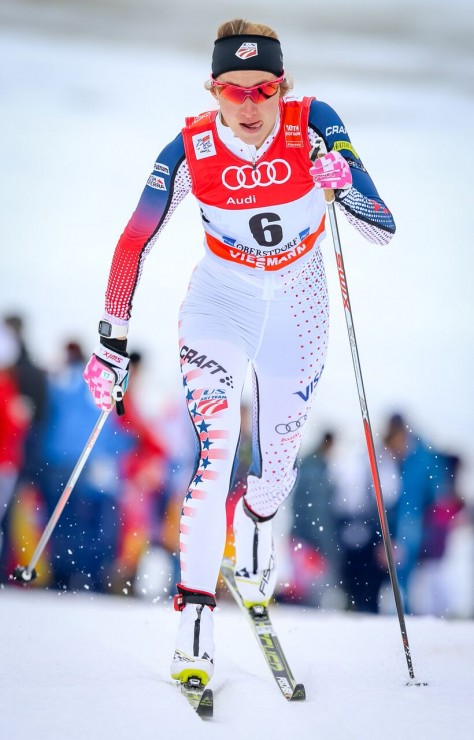
Not only were her skis some of the best gliding the downhills, but she also proved to be one of the most confident downhill skiers.
“She got to the tops of climbs and attacked over them rather than backing off, and that was a big difference-maker today,” Whitcomb said.
There was one particularly treacherous downhill into a turn about halfway into the race. This section gave many athletes trouble during the heats, including a wipeout that took down Caldwell’s teammate Jessie Diggins and out of the running in her quarterfinal.
In the final, Caldwell avoided any potential for downhill trouble when Sweden’s Ida Ingemarsdotter shifted her skis into a snowplow formation, her ski tails nearly skimming Caldwell’s skis. Caldwell shot past her through an opening on the right, step turning the lefthand corner to get within striking distance of the lead.
Another major key to Caldwell’s success proved to be a wise tactical move: lock onto Østberg and never let go. That is, until Caldwell passed her on the final roller over a bridge and led down into the finishing stretch. Caldwell faced Østberg in both the semifinal and final, and clamped down on her ski tails without fail. This helped Caldwell, known recognized as one of the most consistent lucky losers in World Cup sprints, comfortably advance to the final: initially winning her quarterfinal (ahead of Sweden’s Stina Nilsson) and placing second in her semifinal to Østberg.
Østberg won the first quarterfinal by nearly 4 seconds. She entered Tuesday’s race with a broad repertoire of recent sprint podiums, so it fit logic to follow her stride. In the last three skate sprints, she reached the podium in every race. Placing third on Tuesday, she extended her Tour lead over teammate Therese Johaug — a distance skier who notably reached the final and finished fifth (+4.71)
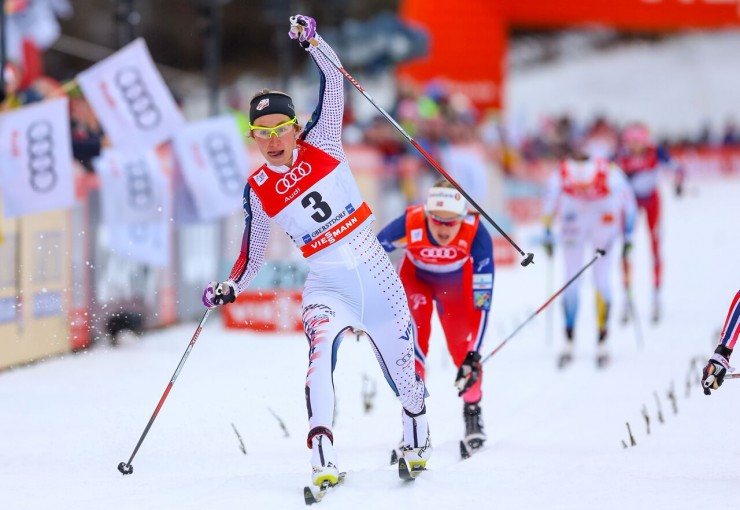
Østberg led the majority of the final with Caldwell behind her, and Weng and Ingemarsdotter skiing beside them in another track. On the final downhill curve, on the backside of the last bridge bump, Caldwell passed Østberg on the inside and led into the finishing flat.
Weng also passed the tiring Østberg and began gaining on Caldwell. But Caldwell was able to hold off Weng in the double-pole derby and take the win with a final lunge, winning by one-tenth of a second.
The favorite to win the overall Tour, Johaug was more than thrilled to finish fifth and earn crucial bonus seconds to stay close to Østberg with four distance races remaining. Sweden’s Ingemarsdotter and Nilsson rounded out the final in fourth (+3.95) and sixth (+27.43), after Nilsson crashed alone at the back of the pack on the troublesome downhill and slid into the barrier lining the course.
Answering a rush of Norwegian reporters after the race, the characteristically modest Caldwell said, “The Norwegians are very dominant, so it feels really good to upset them.
“But they are all so nice,” she added. “At the end, they were all congratulating me. It was a fun race.”
Immediately after finishing, Weng was the first to congratulate Caldwell with a hug. Essentially every other competitor in the final made a point to congratulate her as well in a series of embraces before Caldwell’s victory lap.
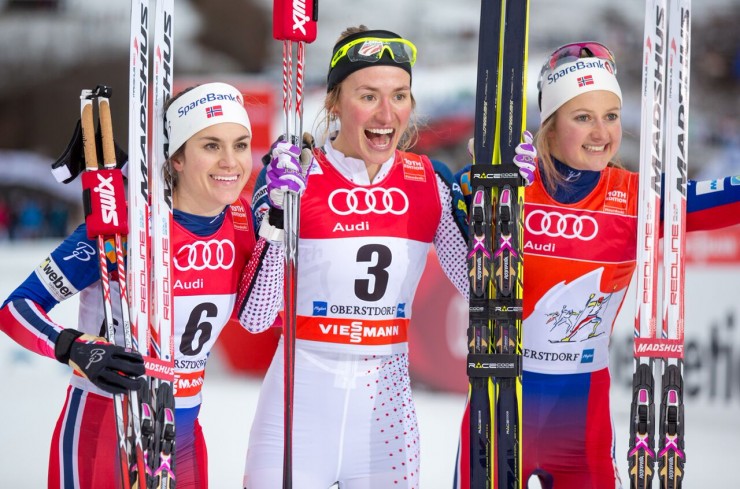
The dynamics between Caldwell and the two Norwegians sharing the podium with her in the post-race press conference could not have been warmer.
“These two girls were faster than me the last couple hundred meters,” Østberg said. “That Sophie could win and the U.S. could get a win, I think that’s so fun.”
A swarm of young children glowing with excitement to get Caldwell’s autograph engulfed the American as she exited the press area. With this, the public celebrations drew to a close and the U.S. team headed back to their hotel with a contagious, electric buzz of team-wide excitement.
“It’s not just about winning, of course, it’s about watching somebody who put in a lot of work, learned how to believe in themselves, and attack a plan and have it work out,” Whitcomb said. “But at the end of the day it’s also really fun to watch Sophie succeed. She cares every bit as much about her teammates as she does about herself. And so it’s a team win today.”
Sophie Caldwell plans to race the 10-kilometer classic mass start in Oberstdorf on Wednesday and possibly also race Stage 6 of the Tour: a 5 k skate in Toblach, Italy. Although she does not plan to finish the Tour, it is worth noting a sizable leap from 27th to 14th in the overall Tour standings with her win on Tuesday.
The rest of the U.S. women: Sargent 15th, Diggins 21st
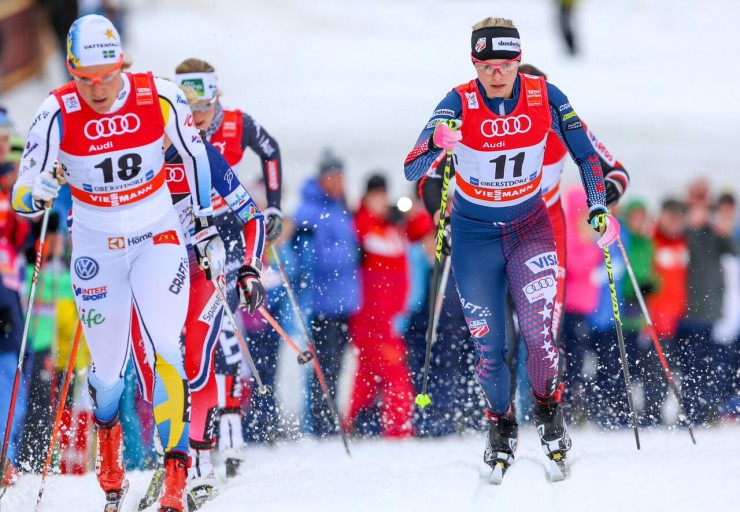
Also for the U.S., Diggins and Ida Sargent qualified for the heats with the 11th and 14th-fastest qualifying times, respectively. Notably, Diggins skied her entire qualifier without a pole basket.
“It fell off at the start and I felt myself punching through, and I was like ‘no way,’ ” she recalled. “So I just skied as hard as I could because I thought, it is going to be a miracle for me to qualify like this.”
Sure enough she did, and in a comfortable 11th, well within the top 30, 8.45 seconds behind Østberg’s top time of 2:38.18.
In the quarterfinals, Diggins’ run ended when she collided with Sweden’s Hanna Falk, who snowplowed the notorious downhill. They entered the descent together, side by side in first and second, but as they picked up speed, the back of one of Falk’s skis clipped Diggins and they both went down. Diggins finished fifth in that heat, 26.22 seconds behind Johaug, who won that quarterfinal.
“The silver linings of today, and I am all about silver linings, are that I felt great … I mean, physically I am fit, I am ready, I am in a good position in the Tour,” Diggins said. She’s currently 10th in the overall standings and 4:33.4 out of the lead. “I am ready for the next race.”
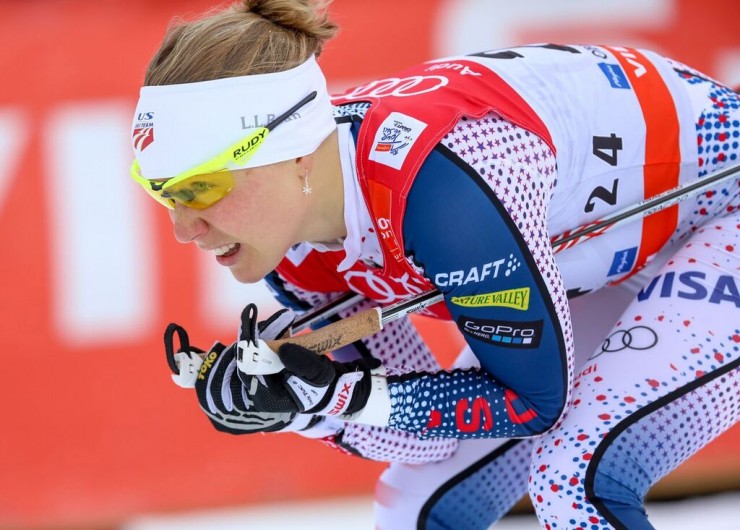
Sargent narrowly avoided the first series of crashes of the day in the first women’s quarterfinal (Sweden’s Charlotte Kalla, Russia’s Natalia Matveeva and Germany’s Nicole Fessel all went down on the same hill) and placed third her heat. Sargent finished 10.36 seconds behind the winner of that quarterfinal, Østberg, which was not enough to advance to the semifinals.
“That downhill was crazy; I was certain I was gonna go down,” Sargent said. “My ski was caught on an ice chunk of some kind so I was really happy to stay up, but I think I needed a little more kick to hammer the [next] uphill.”
At the end of the day, Sargent placed 15th and Diggins 21st overall. Also for the U.S., Rosie Brennan again narrowly missed qualifying in 35th, Sadie Bjornsen did not make the quarterfinals in 44th due to a crash, Liz Stephen finished 49th, and Caitlin Gregg placed 53rd.
In terms of overall Tour standings after four of eight stages, Diggins ranks 10th (+4:33.4), Bjornsen slipped out of the top 10 to 13th (+4:53.7), Caldwell is up to 14th (+5:23.7), Stephen is 25th (+6:22.1), Caitlin Gregg 39th (+8:12.6), Brennan 42nd (+8:33.1), and Sargent 45th (+8:47.3).
Results | Tour standings (after Stage 4)
— Alex Kochon contributed reporting

